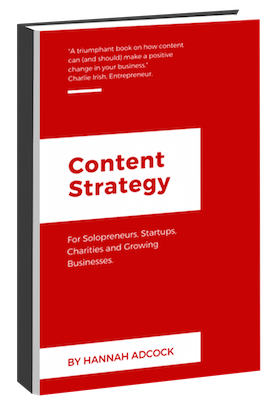How to write a book
When you don’t have any time
Now updated to include advice from other authors!
I don’t know about you, but when I read articles about how you can write a book/learn to cook like a celebrity chef/read Game of Thrones, all in two weeks, I want to scream; but don’t, obviously, because it might wake the baby. These articles nearly always seem to be written by smug young people with very little in the way of responsibility (and going to the gym and sampling artisan beer don’t count).
I have managed to write a book – an ebook on content strategy for startups and small businesses – but it has taken me about two and a half years. Which is also the time it takes to have two children, work part time, exercise a dog, and move house.
In this post I talk about how you can write the book you’ve always dreamed about, even with your many responsibilities, if you just follow a few basic guidelines. I also encourage you to bin unhelpful concepts like multitasking, the superwoman (or superman) complex, and feeling guilty.
Be realistic about your timeframe
You can achieve your goals but if you have family commitments then it might take you a bit longer than two weeks. Say two years. Embrace this kind of time frame. If you are already working and looking after small people, dogs, a house, packing for holidays (a military exercise if ever there was one), doing the washing, doing more washing, managing your finances, and so on, then the fact that you get anything done is cause for celebration.
Writing a book is doable but only if you accept that you aren’t superwoman or superman and no one should expect you to be.

No one should expect you to be a superhero
Accept that 20 minutes is a wonderful opportunity
I fondly remember the days when I’d make myself a cup of tea, wonder around a bit, rearrange my desk and then do some writing, for hours if I wanted. No more. The key to writing a book when you’re busy is to accept that 20 minutes is a wonderful opportunity. If you spot 20 minutes (or even the promise of 20 minutes) sit down and write. The washing up can wait. It doesn’t matter that the house is a bit messy - really, it doesn’t. Don’t go anywhere near social media. Accept that writing in your pyjamas is perfectly acceptable.
I’m always amazed by how much you can get done if you do little bursts frequently. However, if you are tired then don’t feel guilty. Go back to bed. Have a bath. The book can wait
Bin multitasking
I appreciate this goes against the prevailing wisdom but if I try and do lots of jobs at once I end up feeling useless and confused. What helps me instead is to write lists and then do one thing at a time. So if I have 20 minutes (see above) and I decide to write then I’ll do just that, trying to ignore everything else on that list. At least, that way, I achieve something.
Personally, I never try and seriously write or work while looking after my children, which is a full time job in itself. I’ll instead fit writing in when they are napping, or with someone else, or after they’ve gone to bed. In any case, if I tried to work when my toddler around my book would read like this: zzzh4chhhaums 7s8sj as her sticky little fingers got to work.

Multi-tasking often ends badly – like when you try and write while looking after a toddler
Advice from author Ceri Radford
Writing time is sacred time. I try to leave the house and work in a café so that I’m not even remotely tempted to do anything about the general state of domestic chaos. I kept thinking there would be a time when I could write and look after my daughter, but it’s yet to happen. She howled and would only nap in her pram as a small baby, climbed my leg to get at my laptop as a bigger baby, and now at three plays brilliantly by herself until the precise moment she hears the click of my laptop opening.
There is no easy way to be a parent and a writer - they’re two all-encompassing things. I feel better if I’m making progress on something I’m happy with, even if the pace is slower than it used to be. I also comfort myself with the idea that it’s not like I’m a footballer - I’m not going to get worse at writing as I get older. Things will get easier.
Ceri Radford, author of A Surrey State of Affairs, currently working on her second novel
Think about your book while doing other things
I actually did some pretty good thinking about a work project while I was in hospital being induced (my second child was two weeks overdue). There wasn’t much else to do really, so thinking about a project I’d been given seemed like a good way to pass the time. Obviously as events progressed my mind turned to other matters.
However, there are a number of times in a day when you’re doing something that doesn’t require much brain activity: going to the toilet, cooking a familiar dish, having a shower, trying to get the baby to sleep, and so on. This can become quality time for thinking about your latest ebook chapter. Don’t do this, however, if you feel like you need some time to slow down. Just enjoy your shower. Or go to the loo in peace.
Treat yourself to quality writing time
Although writing a book is likely to be your side project, so not something you can easily justify spending money on, try at least occasionally to fence off quality time. See if your partner, friends or family can help with your children, dogs, or other dependants. Pay a cleaner. Employ someone to do odd jobs. I know many or perhaps all of these options may not be available, but see what you can do.
If this project matters to you then you deserve to have at least some quality time to spend on it, if possible. Because you’re worth it, as some wise person said. Or a shampoo advert. I forget which.
Advice from literary consultant and author Claire Wingfield
Having less time as a new mum helped me focus and complete my draft, as I went from having ‘all the time in the world’ and not completing personal projects (always prioritising my work as a freelance editor and literary consultant) to having limited time but an increased sense of both my own creativity and the necessity of time management.
Having less time made me more protective of it and even influenced the format of my creative-writing guide 52 Dates for Writers - Ride a Tandem, Assume an Alias and 50 Other Ways to Improve Your Novel Draft.
Claire Wingfield, literary consultant and author
Get reviewers or a mentor on board
You’re going to have plenty of moments when your enthusiasm flags or you think your book is terrible and no one will buy it. To help you steer past these dispiriting shoals, find yourself a mentor or a group or reviewers early on. They can offer you valuable feedback and motivation while you write the book, as well as helping you publicise it when you ship it.
Begin by thinking who you’d really like to get on board and then reach out to them, even if you haven’t met them yourself. Explain what you’re doing and why you really care about their opinion (treading a fine line between honesty and flattery). You’ll hopefully be surprised by how helpful people can be.

Finding a mentor can help when times get tough and you need help to keep writing
Plan for ongoing research
Putting time aside for research is important when your book is likely to take a year or two to write. You need to stay current and make sure your book is still relevant when you finish it. I did bursts of writing, then some reading, then some revision, and then repeated the whole process. This worked well for me, although I did need to be tough about ending the research stages. Otherwise I’d have never finished my book.
Accept you can always do more – more research, more revision, more editing, and so on. Then move on and get your book finished. You’ll never think your book is perfect but you should feel proud of it. That’s my definition of finished.
Embrace ebooks
I’m a huge fan of ebooks because they are cheap for you to create, easy to update and you get to keep nearly all of the cover price if you sell direct from your own website. Plus you can automate the sales process using various digital delivery providers so that you can make money while you sleep (or try to sleep, if you have young children). Plus with ebooks you can sell to people all over the world, which is particularly important if you’re writing a book on a niche subject.
Of course, you need to put a marketing plan in place otherwise you’ll never sell anything through your own website. But going through a conventional publisher is no guarantee of great sales either (and I’ve done both) and you have to sell a lot more books to take home the same amount of money.
Accept that marketing will be a challenge
The ideal scenario while writing an ebook is as follows: get followers excited about book, write a bit, get feedback, write a bit more, write about writing the book, actually write some more of the book, publish a blog post inspired by the book, and so on. You market the book as you write the book so at your launch people go: ‘wow! I must buy this now!’ I know all this. I’ve even written about it.
However, in practice, if you are writing a book over many months or even years, when you have very little time, something has to give. And this, for me, was often marketing. I did try to market as I went along, but the value of getting people excited about what I was doing was tempered by the fact that by the time I finished they might not care. They could have become a monk. Or the Chief Operating Officer of Facebook.
Instead of managing a ‘hot launch’ for my ebook I’ve had to settle for a ‘tepid’ one. This scenario will hopefully be improved by some after-launch post-children’s-bedtime marketing.
Start writing
If you have an idea for a book that’s been bugging you then sit down and start writing. You can plan and edit another time. Just make a start now. Once you’ve got past this first stage you’ll find it easier to write more. And more. Accept that weeks (and months in my case) will pass when you don’t do anything. Life gets in the way. Don’t feel guilty. Just pick up where you left off when you can and just give yourself a pat on the back that you’re keeping going.
You can write that book. Don’t let anyone – including yourself - tell you any differently. Make a start, keep going, then keep going some more.
You can do it. Good luck!
Content Strategy for Solopreneurs, Startups, Charities and Growing Businesses
This book will help you tackle 12 common business challenges including making sure you're reaching everyone who could be a customer, persuading people to buy from you and not a competitor, and how you can get your team to produce useful usable content. Read more about the ebook.
You'll learn
- How thinking strategically about your content will drive growth
- Practical tips on creating content strategy deliverables that will save you time and money
- How to create a content strategy for your company in 4 weeks
